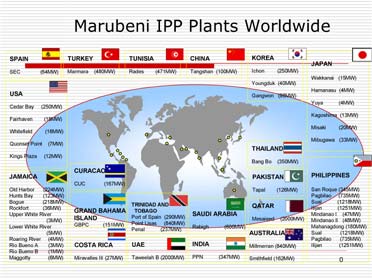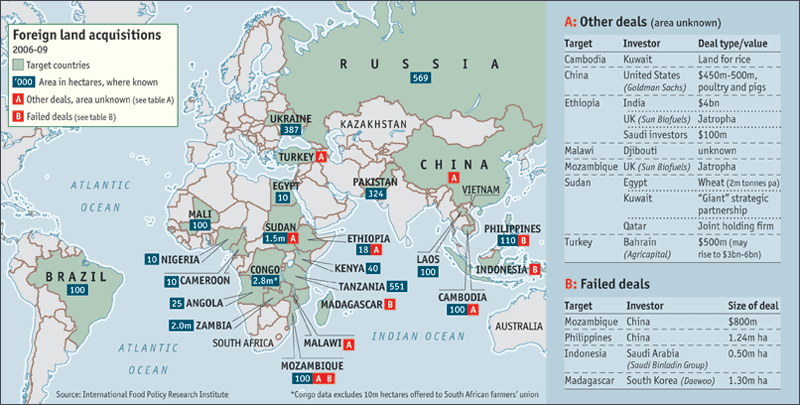Will we see National Food Companies?
 Thursday, December 2, 2010 at 12:01AM
Thursday, December 2, 2010 at 12:01AM  FT story.
FT story.
Marubeni is a Japanese trading company. Historically focused on importing energy and raw materials to resource-poor Japan (the map to the right show's the company's global network of independent power producers), Marubeni is also the world's sixth biggest grain trader by volume.
Marubeni's chief exec just announced that he wants the company to break into the top tier, known as the "ABCD group" (for ADM, Bunge, Cargill, Dreyfus and "lowly" Glencore--which apparently doesn't rank a letter). Marubeni's grain traffic has doubled in the last five years, so it's no idle boast.
My thought, which I've been toying around with in the Wikistrat global model, is that global ag markets already resemble energy markets in their tightness of supply and volatility of price, so, when you consider that France-sized chunk of arable land that's been taken off the market over the past few years through purchases and leasing, can't we start talking about the rise of National Food Companies, or companies that have, as their guiding logic, the securing of food networks abroad for a primary national customer back home?

Economist chart found here.
I mean, when China or Saudi Arabia sign these contracts, I gotta bet we're talking investing entities with some serious ties to the government - advertized or not.
Actually, Marubeni's ambition reflects a region-wide focus, since China is already its bigger market. What's especially interesting about its ambition is how Marubeni uses its grain trade to get into ancillary markets like milling and animal feed processing.
Just got me thinking . . .
 Japan,
Japan,  agriculture,
agriculture,  global economy | in
global economy | in  Citation Post |
Citation Post |  Email Article |
Email Article |  Permalink |
Permalink |  Print Article
Print Article 









Reader Comments (2)
Note to self: be alert to any new branding with Soylent Green.
Interesting thoughts. Would those NFCs vertically integrate the food supply chain, like an oil company buying the oil field, refinery, and the gas station?
If these state companies becomes such a large player in the market, that they control the market, does that lead to strife (food wars) faster or slower?
If THE Saudi Arabian national food company takes all my grain, I can see how a state-vs-state conflict could arise more easily, than say if Saudi Arabia's version of Cargill (a completely private entity, if that is possible there) restricts supply. A country cannot go to war with a company with guns and bombs (taxes and tariffs and other yucky things, sure).
What would serve as the regulating factor for these NFCs?
Are my questions too negative? ;-)